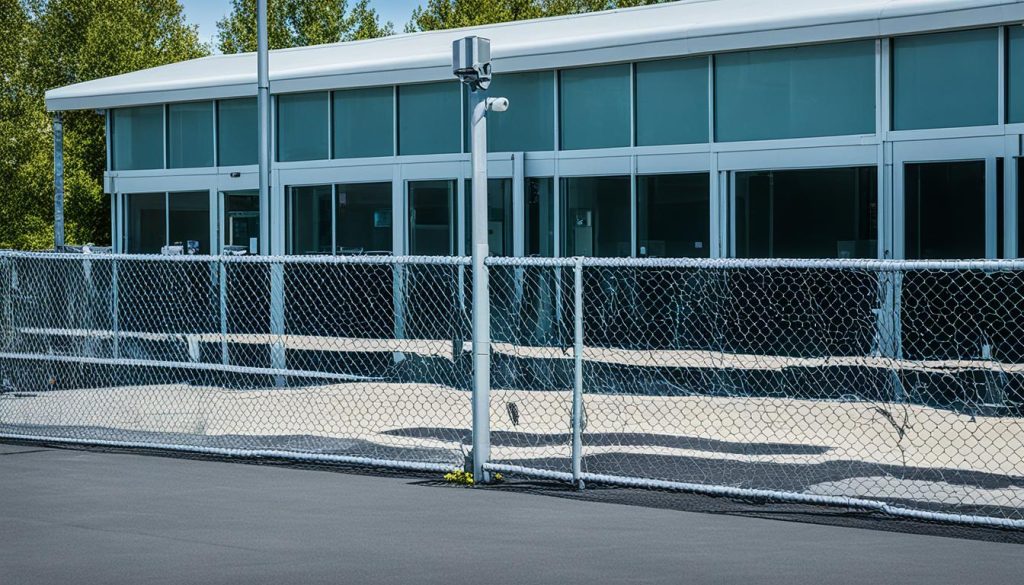Securing business insurance is crucial for the long-term success of your business. Without proper insurance coverage, your company can face financial losses and potential threats to its survival. Business security plays a vital role in fostering growth and protecting your data, assets, and customers. By investing in business insurance now, you can boost productivity, lower insurance premiums, reduce the risk of theft or damage, gain customer trust, increase foot traffic, safeguard commercial secrets, and minimize financial losses. It’s important to prioritize both physical and online business security measures to ensure comprehensive protection.
Key Takeaways:
- Securing business insurance is essential for long-term success.
- Proper insurance coverage protects your business from financial losses.
- Investing in business insurance boosts productivity and customer trust.
- Implement physical and online security measures for comprehensive protection.
- Minimize financial losses and safeguard your business assets.
The Importance of Business Security for Growth
Business security is essential for driving growth within your company. Implementing security measures such as CCTV cameras and door entry passes can boost employee productivity and ensure greater accountability. Additionally, investing in business security can lead to lower insurance premiums, freeing up resources that can be used more productively.
By demonstrating a commitment to keeping customer data secure, you can gain their trust and loyalty, giving you a competitive edge in the market. Enhanced physical security also promotes a safe environment, increasing foot traffic to your business.

Investing in business security measures not only protects your company from potential threats but also has a positive impact on various aspects of your operation.
“By taking steps to secure our business premises, we’ve noticed a significant increase in employee productivity and a decrease in costly disruptions caused by unauthorized personnel. Our customers appreciate the extra level of security, which has resulted in increased trust and loyalty.”
Implementing comprehensive business security measures ensures that your company is prepared to handle any potential risks. It shows your dedication to risk management and the safeguarding of your employees, assets, and customer information.
- Secure access control systems
- Surveillance cameras
- Alarm systems
- Security personnel
These measures not only protect your business, but they also provide peace of mind and instill confidence in your customers and employees, leading to long-term success.
Physical Business Security Measures
To ensure the physical security of your business, it is essential to implement a range of measures that protect your assets and safeguard sensitive information. The following steps can help enhance your physical business security:
- Create an inventory list: Start by creating an inventory list of all your company’s assets. This list will help you keep track of your valuable items and identify any discrepancies.
- Secure company documents: It is crucial to secure important documents that contain sensitive information. Use locked cabinets or safes to store these documents and restrict access to authorized personnel only.
- Plan alarm response: Develop a clear plan for responding to alerts triggered by your business security system. This plan should outline the necessary steps to be taken in the event of a security breach, ensuring a swift and effective response.
- Implement GPS tracking: Installing GPS tracking devices on assets and vehicles can provide real-time location information. This enables you to monitor their whereabouts, helping mitigate the risk of theft or unauthorized use.
- Secure rooms: Designate secure rooms within your business premises to protect valuable equipment and sensitive data. These rooms should have limited access and be equipped with additional security measures, such as access control systems and surveillance cameras.
- Hire on-site security guards: Utilize the services of trained and experienced on-site security guards or mobile patrols. Their presence acts as a deterrent to potential threats and ensures a proactive approach to security.
- Install industrial-strength locks: Enhance the security of your buildings by fitting industrial-strength locks on entry points. These locks provide added resistance against forced entry attempts.
- Deploy door access systems: Implement door access systems that require authorized credentials, such as key cards or biometric data, for entry. This ensures that only authorized individuals can access restricted areas.
- Utilize security cameras: Install security cameras throughout your business premises to monitor activity and deter potential threats. Ensure that the cameras cover critical areas and have clear visibility.
- Install alarm systems: Implement alarm systems that can detect unauthorized entry or suspicious activities. These systems can automatically trigger alerts and notify authorities, improving response time in case of a security breach.
- Establish a storage and disposal process: Establish a secure storage and disposal process for sensitive files and documents. This process should include proper encryption, restricted access, and safe disposal methods, such as shredding, to prevent unauthorized access or data breaches.
By implementing these physical security measures, you can significantly enhance the protection of your business, assets, and sensitive information.

Online Business Security Measures
Protecting your online business is crucial in today’s digital landscape. With the increasing prevalence of cyber threats and data breaches, implementing robust security measures is essential to safeguard sensitive business information and maintain the integrity of your online operations.
To enhance your online business security, consider the following measures:
- Create an Approved Devices List: Establish a list of approved devices that can connect to your network, ensuring that only authorized devices can access your business systems. This helps prevent unauthorized access and potential security breaches.
- Implement Wi-Fi Access Control: Utilize Wi-Fi access control technologies to restrict entry to your wireless network. This enhances security by allowing only authorized users to connect and access sensitive business data.
- Obtain Cyber Liability Insurance: Protect your business against potential financial losses resulting from data breaches or cyberattacks by obtaining cyber liability insurance. This coverage can help cover the costs associated with data recovery, legal expenses, and customer notification.
Additionally, there are best practices that you can implement to strengthen your online business security:
- Clear Contracts: Ensure that contracts with vendors, partners, and clients include clear provisions for data protection and security.
- Create a Safe Work Environment: Educate employees about online security best practices and establish policies that promote a safe work environment, such as strong password requirements and regular software updates.
- Employee Training on Business Equipment: Provide comprehensive training to employees on how to effectively use and secure business equipment, including computers, laptops, and mobile devices.
By implementing these measures and practices, you can significantly reduce the risk of data breaches and protect your online business from potential cyber threats.

Understanding Different Types of Business Insurance
When it comes to protecting your business, having the right insurance coverage is essential. There are various types of business insurance that offer different forms of coverage to meet your specific needs. By understanding these different types of insurance, you can ensure that your business is adequately protected.
Commercial Property Insurance
Commercial property insurance is designed to protect your business against property damage. This type of insurance can cover your building, equipment, inventory, and other physical assets in the event of fire, theft, vandalism, or natural disasters. It provides financial reimbursement for repairs or replacement, helping to minimize the impact of property damage on your business operations.
Liability Coverage
Liability coverage is crucial for protecting your business from legal claims and financial liabilities. It provides coverage for lawsuits, medical expenses, and damages resulting from accidents, injuries, or negligence. Liability coverage can also include product liability, which protects against claims regarding product defects or injuries caused by your products.
Employee Insurance
Employee insurance is essential for protecting your employees and your business. Workers’ compensation insurance covers medical expenses and lost wages for employees who are injured or become ill while performing their job duties. Disability insurance provides financial support to employees who are unable to work due to a disability. Having these insurance policies in place demonstrates your commitment to the well-being of your employees.
General Liability Insurance and Professional Liability Insurance
General liability insurance covers your business against claims of bodily injury, property damage, and personal injury. It provides coverage for legal defense costs and any settlements or judgments that may be awarded. Professional liability insurance, also known as errors and omissions insurance, protects businesses that provide professional services. It covers claims of negligence, errors, or omissions in the services provided.
Business Owner’s Policy (BOP)
A business owner’s policy (BOP) is a comprehensive insurance package that combines multiple coverages into a single policy. It typically includes general liability insurance, property insurance, and business interruption insurance. A BOP is designed to provide convenience and comprehensive protection for small and medium-sized businesses.
By understanding the different types of business insurance, you can choose the coverage that best suits your business needs. Whether it’s protecting your property, ensuring liability coverage, or providing employee benefits, having the right insurance can safeguard your business and provide peace of mind.

When Do Businesses Need Insurance?
Insurance coverage is essential for businesses of all sizes and industries. Whether you’re a small startup or a well-established company, having the right insurance safeguards your business and provides protection against unforeseen risks. Different factors determine when your business needs insurance, including employee count, business growth, lease agreements, industry-specific requirements, and legal obligations. Let’s explore these factors in more detail.
Employee Count
If your business has employees, it’s essential to have insurance coverage to protect both your employees and your company. Workers’ compensation and disability insurance, for example, ensure that your employees receive compensation for work-related injuries or illnesses. These coverages not only fulfill legal requirements but also provide financial security for your employees and shield your business from costly lawsuits.
Business Growth
As your business expands and evolves, your insurance needs may change. It’s crucial to regularly review and update your insurance policies to ensure they adequately cover your growing operations. A comprehensive insurance policy can safeguard your business assets, including property, inventory, and equipment, while also protecting you against liabilities that may arise due to business growth.
Industry-Specific Insurance
Certain industries have unique risks and potential liabilities that require specific insurance coverages. For instance, construction companies may need contractor’s liability insurance, while medical practices may require malpractice insurance. It’s important to be aware of any industry-specific insurance requirements applicable to your business and ensure you have adequate coverage to address these risks.
Lease Agreements
When leasing a commercial space, landlords often require proof of insurance coverage to protect their property and ensure your liability. General liability insurance is commonly required to cover property damage or injuries that may occur on the leased premises. It’s essential to carefully review the lease agreement and understand the insurance requirements before signing any lease contracts.
Legal Requirements
Both state and federal laws may impose certain insurance obligations on businesses. For example, commercial auto insurance is typically required if your business uses vehicles for deliveries or transportation. Businesses with employees may be mandated to have workers’ compensation insurance and disability insurance to comply with labor laws. Understanding and fulfilling these legal requirements is crucial to avoiding penalties and ensuring the financial security of your business.
By prioritizing insurance coverage based on these factors, your business can operate with confidence, knowing that you have taken proactive steps to protect your assets, employees, and customers.
“Insurance is not only a legal requirement but a vital tool in protecting businesses from potential risks and financial losses. By staying informed and assessing your insurance needs regularly, you can ensure that your business is adequately protected, giving you peace of mind and the freedom to focus on what you do best: running your business.”
Remember, insurance is a crucial part of risk management and long-term success. It’s always recommended to consult a licensed insurance agent or broker who can provide expert advice tailored to your specific business needs.

Conclusion
Business insurance is an essential investment that provides numerous benefits for your company. By securing the right insurance coverage, you can protect yourself against financial losses resulting from unexpected events and lawsuits. This not only safeguards the credibility of your business but also ensures its long-term success.
Implementing effective risk management practices and choosing the right insurance policies can save you money in the long run. With comprehensive business insurance, you can protect your valuable assets, provide security for your employees, and build trust with your customers. It demonstrates your responsibility and commitment to taking ownership of liability, giving you peace of mind.
No matter the size or industry of your business, securing business insurance is vital for protecting your livelihood. It provides the necessary protection and peace of mind that allow you to focus on growing your business and achieving your goals. So don’t delay, invest in business insurance today and safeguard the future of your company.




No comments! Be the first commenter?